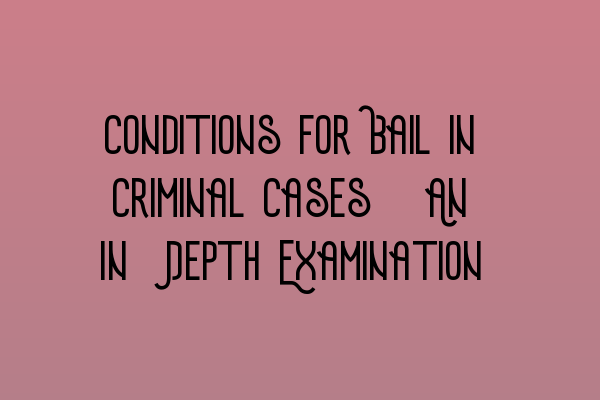Conditions for Bail in Criminal Cases: An In-Depth Examination
At SQE Criminal Law & Practice Law UK, we understand the importance of bail in criminal cases. Bail serves as a mechanism to ensure that individuals accused of crimes can continue their lives outside of custody while awaiting trial. In this blog post, we will provide an in-depth examination of the conditions for bail in criminal cases, shedding light on the intricate details that underpin this legal process.
The Purpose of Bail
Bail is a fundamental aspect of criminal law that aims to strike a delicate balance between the interests of justice and the rights of the accused. It allows individuals to retain their freedom while ensuring their appearance in court proceedings. The primary purposes of bail are:
- Preventing the commission of further offenses
- Preventing interference with witnesses or evidence
- Ensuring the accused’s appearance in court
Understanding the conditions for bail is essential for both the accused individuals and their legal representatives. It helps them navigate the complexities of the criminal justice system and make informed decisions to safeguard the rights and interests of the accused.
Conditions for Bail
When determining the conditions for bail, courts consider various factors to ensure the safety of the community and the likelihood of the accused appearing in court. These factors include:
- Severity of the offense: The seriousness of the crime committed is a crucial factor that determines the conditions for bail. More severe offenses may require stricter bail conditions.
- Risk to the community: Courts consider whether the accused poses a risk to the community. If there is evidence suggesting that the accused may endanger others, the bail conditions may be more stringent.
- Flight risk: The likelihood of the accused fleeing and not appearing for their court date is another factor. If there are concerns about the accused’s flight risk, the bail conditions may include restrictions on travel or the requirement of a surety.
- Previous criminal history: The accused’s criminal record is taken into account. A history of previous offenses may influence the conditions for bail.
- Mental health and substance abuse issues: If there are concerns about the accused’s mental health or substance abuse problems, the court may impose additional conditions such as mandatory counseling or treatment programs.
It is important to note that the conditions for bail can vary on a case-by-case basis. The court’s primary objective is to ensure the safety of the community and guarantee the accused’s appearance in court, while also considering the individual circumstances of each case.
Related Articles:
- SQE Exam Prep: Essential Study Materials for Aspiring Solicitors
- Demystifying the Solicitors Qualifying Examination Format
- SQE Exam for International Lawyers: Challenges and Success Strategies
- LLC Formation Made Simple: Step-by-Step Guide for UK Entrepreneurs
- LLC Formation: A Step-by-Step Guide for UK Entrepreneurs
For more information on related topics, please visit the above articles.
At SQE Criminal Law & Practice Law UK, we are committed to providing comprehensive legal resources and expert insights into the complexities of criminal law. If you or someone you know is facing criminal charges and requires legal assistance, our team of experienced solicitors is here to help.
Disclaimer: This blog post is intended for informational purposes only and does not constitute legal advice. The information provided is accurate at the time of writing, but laws and regulations may change, and individual cases may vary. For personalized legal advice, please consult with a qualified solicitor.
